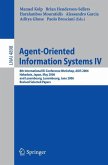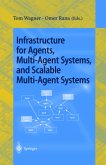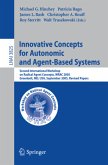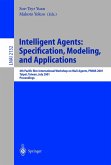Michal Pechoucek / Paolo Petta / Laszlo Zsolt Varga (eds.)4th International Central and Eastern European Conference on Multi-Agent Systems, CEEMAS 2005, Budapest, Hungary, September 15-17, 2005, Proceedings
Multi-Agent Systems and Applications IV
4th International Central and Eastern European Conference on Multi-Agent Systems, CEEMAS 2005, Budapest, Hungary, September 15-17, 2005, Proceedings
Herausgegeben:Pechoucek, Michal; Petta, Paolo; Varga, Laszlo Zsolt
Michal Pechoucek / Paolo Petta / Laszlo Zsolt Varga (eds.)4th International Central and Eastern European Conference on Multi-Agent Systems, CEEMAS 2005, Budapest, Hungary, September 15-17, 2005, Proceedings
Multi-Agent Systems and Applications IV
4th International Central and Eastern European Conference on Multi-Agent Systems, CEEMAS 2005, Budapest, Hungary, September 15-17, 2005, Proceedings
Herausgegeben:Pechoucek, Michal; Petta, Paolo; Varga, Laszlo Zsolt
- Broschiertes Buch
- Merkliste
- Auf die Merkliste
- Bewerten Bewerten
- Teilen
- Produkt teilen
- Produkterinnerung
- Produkterinnerung
The aim of the CEEMAS conference series is to provide a biennial forum for the presentation of multi-agent research and development results. With its p- ticular geographicalorientation towards Central and Eastern Europe, CEEMAS has become an internationally recognised event with participants from all over the world. After the successful CEEMAS conferences in St. Petersburg (1999), Cracow (2001) and Prague (2003), the 2005 CEEMAS conference takes place in Budapest. The programme committee of the conference series consists of est- lished researchers from the region and renowned international…mehr
Andere Kunden interessierten sich auch für
![Agent-Oriented Information Systems IV Agent-Oriented Information Systems IV]() Agent-Oriented Information Systems IV38,99 €
Agent-Oriented Information Systems IV38,99 €![Infrastructure for Agents, Multi-Agent Systems, and Scalable Multi-Agent Systems Infrastructure for Agents, Multi-Agent Systems, and Scalable Multi-Agent Systems]() Tom Wagner / Omer F. Rana (eds.)Infrastructure for Agents, Multi-Agent Systems, and Scalable Multi-Agent Systems39,99 €
Tom Wagner / Omer F. Rana (eds.)Infrastructure for Agents, Multi-Agent Systems, and Scalable Multi-Agent Systems39,99 €![Innovative Concepts for Autonomic and Agent-Based Systems Innovative Concepts for Autonomic and Agent-Based Systems]() Michael G. Hinchey / Patricia Rago / James L. Rash / Christopher A. Rouff / Roy Sterritt / Walt Truszkowski (eds.)Innovative Concepts for Autonomic and Agent-Based Systems39,99 €
Michael G. Hinchey / Patricia Rago / James L. Rash / Christopher A. Rouff / Roy Sterritt / Walt Truszkowski (eds.)Innovative Concepts for Autonomic and Agent-Based Systems39,99 €![Intelligent Agents and Multi-Agent Systems Intelligent Agents and Multi-Agent Systems]() Jaeho Lee / Mike Barley (eds.)Intelligent Agents and Multi-Agent Systems39,99 €
Jaeho Lee / Mike Barley (eds.)Intelligent Agents and Multi-Agent Systems39,99 €![Intelligent Agents and Multi-Agent Systems Intelligent Agents and Multi-Agent Systems]() Kazuhiro Kuwabara / Jaeho Lee (eds.)Intelligent Agents and Multi-Agent Systems39,99 €
Kazuhiro Kuwabara / Jaeho Lee (eds.)Intelligent Agents and Multi-Agent Systems39,99 €![Intelligent Agents and Multi-Agent Systems Intelligent Agents and Multi-Agent Systems]() Michael Wayne Barley / Nik Kasabov (eds.)Intelligent Agents and Multi-Agent Systems39,99 €
Michael Wayne Barley / Nik Kasabov (eds.)Intelligent Agents and Multi-Agent Systems39,99 €![Intelligent Agents: Specification, Modeling, and Application Intelligent Agents: Specification, Modeling, and Application]() Soe-Tsyr Yuan / Makoto Yokoo (eds.)Intelligent Agents: Specification, Modeling, and Application39,99 €
Soe-Tsyr Yuan / Makoto Yokoo (eds.)Intelligent Agents: Specification, Modeling, and Application39,99 €-
-
-
The aim of the CEEMAS conference series is to provide a biennial forum for the presentation of multi-agent research and development results. With its p- ticular geographicalorientation towards Central and Eastern Europe, CEEMAS has become an internationally recognised event with participants from all over the world. After the successful CEEMAS conferences in St. Petersburg (1999), Cracow (2001) and Prague (2003), the 2005 CEEMAS conference takes place in Budapest. The programme committee of the conference series consists of est- lished researchers from the region and renowned international colleagues, sh- ing the prominent rank of CEEMAS among the leading events in multi-agent systems. In the very competitive ?eld of agent oriented conferences and workshops nowadays(suchasAAMAS,WI/IAT,EUMAS,CIA,MATES)thespecialpro?le of CEEMAS is that it is trying to bridge the gap between applied research achievements and theoretical research activities. Our ambition is to provide a forum for presenting theoretical research with an evident application potential, implemented application prototypes and their properties, as well as industrial case studies of successful (but also unsuccessful) agent technology deployments. This is why the CEEMAS proceedings volume provides a collection of research and application papers. The technical research paper section of the proceedings (see pages 11-499) contains pure research papers as well as research results in application settings while the application papers section (see pages 500-530) contains papers focused on application aspects. The goal is to demonstrate the real life value and commercial reality of multi-agent systems as well as to foster communication between academia and industry in this ?eld.
Produktdetails
- Produktdetails
- Lecture Notes in Computer Science 3690
- Verlag: Springer / Springer Berlin Heidelberg / Springer, Berlin
- Artikelnr. des Verlages: 11559221, 978-3-540-29046-9
- 2005
- Seitenzahl: 688
- Erscheinungstermin: 6. September 2005
- Englisch
- Abmessung: 235mm x 155mm x 37mm
- Gewicht: 957g
- ISBN-13: 9783540290469
- ISBN-10: 354029046X
- Artikelnr.: 20946633
- Herstellerkennzeichnung Die Herstellerinformationen sind derzeit nicht verfügbar.
- Lecture Notes in Computer Science 3690
- Verlag: Springer / Springer Berlin Heidelberg / Springer, Berlin
- Artikelnr. des Verlages: 11559221, 978-3-540-29046-9
- 2005
- Seitenzahl: 688
- Erscheinungstermin: 6. September 2005
- Englisch
- Abmessung: 235mm x 155mm x 37mm
- Gewicht: 957g
- ISBN-13: 9783540290469
- ISBN-10: 354029046X
- Artikelnr.: 20946633
- Herstellerkennzeichnung Die Herstellerinformationen sind derzeit nicht verfügbar.
Michal Pechoucek, Czech Technical University, Prague, Czech Republic / Paolo Petta, Austrian Research Institute for Artificial Intelligence
Invited Paper.- Palpable Computing and the Role of Agent Technology.- Research Papers.- A Dynamic Joint Protocols Selection Method to Perform Collaborative Tasks.- A Formal Framework for Interaction Protocol Engineering.- Towards a Conversational Language for Artificial Agents in Mixed Community.- Adaptive Mobile Multi-agent Systems.- Agent Encapsulation in a Cognitive Vision MAS.- A Model of Multi-agent System Based on Policies and Contracts.- Case-Based Student Modeling in Multi-agent Learning Environment.- Intelligent Virtual Environments for Training: An Agent-Based Approach.- Patient Driven Mobile Platform to Enhance Conventional Wheelchair, with Multiagent System Supervisory Control.- SECMAP: A Secure Mobile Agent Platform.- What Is Context and How Can an Agent Learn to Find and Use it When Making Decisions?.- A Formal Modelling Framework for Developing Multi-agent Systems with Dynamic Structure and Behaviour.- Discovery of Crises via Agent-Based Simulation of a Transportation System.- Evaluating the Feasibility of Method Engineering for the Creation of Agent-Oriented Methodologies.- Formalizing Compatibility and Substitutability of Rolebased Interactions Components in Multi-agent Systems.- MAS Meta-models on Test: UML vs. OPM in the SODA Case Study.- Programming an Agent as Abstract State Machine.- The PASSI and Agile PASSI MAS Meta-models Compared with a Unifying Proposal.- The Synthesis Stage in the Software Agent Development Process.- Use Case and Actor Driven Requirements Engineering: An Evaluation of Modifications to Prometheus.- Agent-Based Management of Non Urban Road Meteorological Incidents.- Arguing and Negotiating in the Presence of Social Influences.- Cooperative Behavior of Agents Based on Potential Field.- The "Dance or Work" Problem: Why Do notall Honeybees Dance with Maximum Intensity.- Towards an Institutional Environment Using Norms for Contract Performance.- Virtual Games: A New Approach to Implementation of Social Choice Rules.- How Our Beliefs Contribute to Interpret Actions.- The Effect of Flag Introduction on the Explosion of Nogood Values in the Case of ABT Family Techniques.- Toward a Formal Theory of Belief, Capability and Promise Incorporating Temporal Aspect.- A Multi-agent Fuzzy-Reinforcement Learning Method for Continuous Domains.- An Adaptive Approach for the Exploration-Exploitation Dilemma for Learning Agents.- A Multi Agent Approach to Interest Profiling of Users.- vBroker: Artificial Agents Helping to Stock Up on Knowledge.- Cooperative Planning in the Supply Network - A Multiagent Organization Model.- Diagnosis of Plans and Agents.- Dialectical Theory for Multi-agent Assumption-Based Planning.- Keeping Plan Execution Healthy.- Stochastic Reactive Production Scheduling by Multi-agent Based Asynchronous Approximate Dynamic Programming.- Do Agents Make Model Checking Explode (Computationally)?.- Multiagent Resource Allocation in the Presence of Externalities.- On Communication in Solving Distributed Constraint Satisfaction Problems.- Towards Reliable Large-Scale Multi-agent Systems.- Emergent Timetabling Organization.- Experiments in Emergent Programming Using Self-organizing Multi-agent Systems.- A Direct Reputation Model for VO Formation.- Adversarial Behavior in Multi-agent Systems.- Bayesian Dynamic Trust Model.- Behavior Evaluation with Actions' Sampling in Multi-agent System.- Agent-Based Control of a Municipal Water System.- Agent-Based Framework for Simulation and Support of Dynamic Engineering Design Processes in PSI.- Situated Agents and the Web: Supporting Site Adaptivity.-Short Research Papers.- An Operational Model for Mutual Awareness.- Chomsky: A Content Language Translation Agent.- Roles and Hierarchy in Multi-agent Organizations.- Semantic and Virtual Agents Model in Adaptive Middleware Architecture for Smart Vehicle Space.- Towards an Authority Sharing Based on the Viewpoint Action Model.- Application of Multi-agent Systems and Social Network Theory to Petrol Pricing on UK Motorways.- Combining Rule-Based and Plug-in Components in Agents for Flexible Dynamic Negotiations.- Group Interests of Agents Functioning in Changing Environments.- Policies for Common Awareness in Organized Settings.- Learning in a Multi-agent Approach to a Fish Bank Game.- Modelling of Agents' Behavior with Semi-collaborative Meta-agents.- Pareto-Q Learning Algorithm for Cooperative Agents in General-Sum Games.- Selection in Scale-Free Small World.- A Multi-agent System Architecture for the Adaptation of User Interfaces.- ACE Agents - Mass Personalized Software Assistance.- Assisting Robotic Personal Agent and Cooperating Alternative Input Devices for Severely Disabled Children.- Building Agent-Based Systems in a Discrete-Event Simulation Environment.- Complexity of Task Coordination for Non Cooperative Planning Agents.- Resource Coordination on MAS Multi-plans Context.- Using Negotiation Techniques as Time-Restricted Scheduling Policies on Intelligent Agents.- Performance Comparison of Multi-agent Systems.- A Complexity Based Feature to Support Emergence in MAS.- Adaptive Document Analysis with Planning.- A Self-configuring Agent-Based Document Indexing System.- Managing Trust for Secure Active Networks.- Short Application Papers.- A Case Study of Agent-Based Virtual Enterprise Modelling.- Agent-Based Support for Open Communities.- Architecture-CentricDevelopment of an AGV Transportation System.- Goodness and Lacks of MAS Methodologies for Manufacturing Domains.- Multiagents Applied to Humanitarian Demining.- Simulating Automatic High Bay Warehouses Using Agents.- Strategies for Distributed Underwater Survey.- The Role of Ontologies in a Multi-agent Based Data Integration System.
Invited Paper.- Palpable Computing and the Role of Agent Technology.- Research Papers.- A Dynamic Joint Protocols Selection Method to Perform Collaborative Tasks.- A Formal Framework for Interaction Protocol Engineering.- Towards a Conversational Language for Artificial Agents in Mixed Community.- Adaptive Mobile Multi-agent Systems.- Agent Encapsulation in a Cognitive Vision MAS.- A Model of Multi-agent System Based on Policies and Contracts.- Case-Based Student Modeling in Multi-agent Learning Environment.- Intelligent Virtual Environments for Training: An Agent-Based Approach.- Patient Driven Mobile Platform to Enhance Conventional Wheelchair, with Multiagent System Supervisory Control.- SECMAP: A Secure Mobile Agent Platform.- What Is Context and How Can an Agent Learn to Find and Use it When Making Decisions?.- A Formal Modelling Framework for Developing Multi-agent Systems with Dynamic Structure and Behaviour.- Discovery of Crises via Agent-Based Simulation of a Transportation System.- Evaluating the Feasibility of Method Engineering for the Creation of Agent-Oriented Methodologies.- Formalizing Compatibility and Substitutability of Rolebased Interactions Components in Multi-agent Systems.- MAS Meta-models on Test: UML vs. OPM in the SODA Case Study.- Programming an Agent as Abstract State Machine.- The PASSI and Agile PASSI MAS Meta-models Compared with a Unifying Proposal.- The Synthesis Stage in the Software Agent Development Process.- Use Case and Actor Driven Requirements Engineering: An Evaluation of Modifications to Prometheus.- Agent-Based Management of Non Urban Road Meteorological Incidents.- Arguing and Negotiating in the Presence of Social Influences.- Cooperative Behavior of Agents Based on Potential Field.- The "Dance or Work" Problem: Why Do notall Honeybees Dance with Maximum Intensity.- Towards an Institutional Environment Using Norms for Contract Performance.- Virtual Games: A New Approach to Implementation of Social Choice Rules.- How Our Beliefs Contribute to Interpret Actions.- The Effect of Flag Introduction on the Explosion of Nogood Values in the Case of ABT Family Techniques.- Toward a Formal Theory of Belief, Capability and Promise Incorporating Temporal Aspect.- A Multi-agent Fuzzy-Reinforcement Learning Method for Continuous Domains.- An Adaptive Approach for the Exploration-Exploitation Dilemma for Learning Agents.- A Multi Agent Approach to Interest Profiling of Users.- vBroker: Artificial Agents Helping to Stock Up on Knowledge.- Cooperative Planning in the Supply Network - A Multiagent Organization Model.- Diagnosis of Plans and Agents.- Dialectical Theory for Multi-agent Assumption-Based Planning.- Keeping Plan Execution Healthy.- Stochastic Reactive Production Scheduling by Multi-agent Based Asynchronous Approximate Dynamic Programming.- Do Agents Make Model Checking Explode (Computationally)?.- Multiagent Resource Allocation in the Presence of Externalities.- On Communication in Solving Distributed Constraint Satisfaction Problems.- Towards Reliable Large-Scale Multi-agent Systems.- Emergent Timetabling Organization.- Experiments in Emergent Programming Using Self-organizing Multi-agent Systems.- A Direct Reputation Model for VO Formation.- Adversarial Behavior in Multi-agent Systems.- Bayesian Dynamic Trust Model.- Behavior Evaluation with Actions' Sampling in Multi-agent System.- Agent-Based Control of a Municipal Water System.- Agent-Based Framework for Simulation and Support of Dynamic Engineering Design Processes in PSI.- Situated Agents and the Web: Supporting Site Adaptivity.-Short Research Papers.- An Operational Model for Mutual Awareness.- Chomsky: A Content Language Translation Agent.- Roles and Hierarchy in Multi-agent Organizations.- Semantic and Virtual Agents Model in Adaptive Middleware Architecture for Smart Vehicle Space.- Towards an Authority Sharing Based on the Viewpoint Action Model.- Application of Multi-agent Systems and Social Network Theory to Petrol Pricing on UK Motorways.- Combining Rule-Based and Plug-in Components in Agents for Flexible Dynamic Negotiations.- Group Interests of Agents Functioning in Changing Environments.- Policies for Common Awareness in Organized Settings.- Learning in a Multi-agent Approach to a Fish Bank Game.- Modelling of Agents' Behavior with Semi-collaborative Meta-agents.- Pareto-Q Learning Algorithm for Cooperative Agents in General-Sum Games.- Selection in Scale-Free Small World.- A Multi-agent System Architecture for the Adaptation of User Interfaces.- ACE Agents - Mass Personalized Software Assistance.- Assisting Robotic Personal Agent and Cooperating Alternative Input Devices for Severely Disabled Children.- Building Agent-Based Systems in a Discrete-Event Simulation Environment.- Complexity of Task Coordination for Non Cooperative Planning Agents.- Resource Coordination on MAS Multi-plans Context.- Using Negotiation Techniques as Time-Restricted Scheduling Policies on Intelligent Agents.- Performance Comparison of Multi-agent Systems.- A Complexity Based Feature to Support Emergence in MAS.- Adaptive Document Analysis with Planning.- A Self-configuring Agent-Based Document Indexing System.- Managing Trust for Secure Active Networks.- Short Application Papers.- A Case Study of Agent-Based Virtual Enterprise Modelling.- Agent-Based Support for Open Communities.- Architecture-CentricDevelopment of an AGV Transportation System.- Goodness and Lacks of MAS Methodologies for Manufacturing Domains.- Multiagents Applied to Humanitarian Demining.- Simulating Automatic High Bay Warehouses Using Agents.- Strategies for Distributed Underwater Survey.- The Role of Ontologies in a Multi-agent Based Data Integration System.









